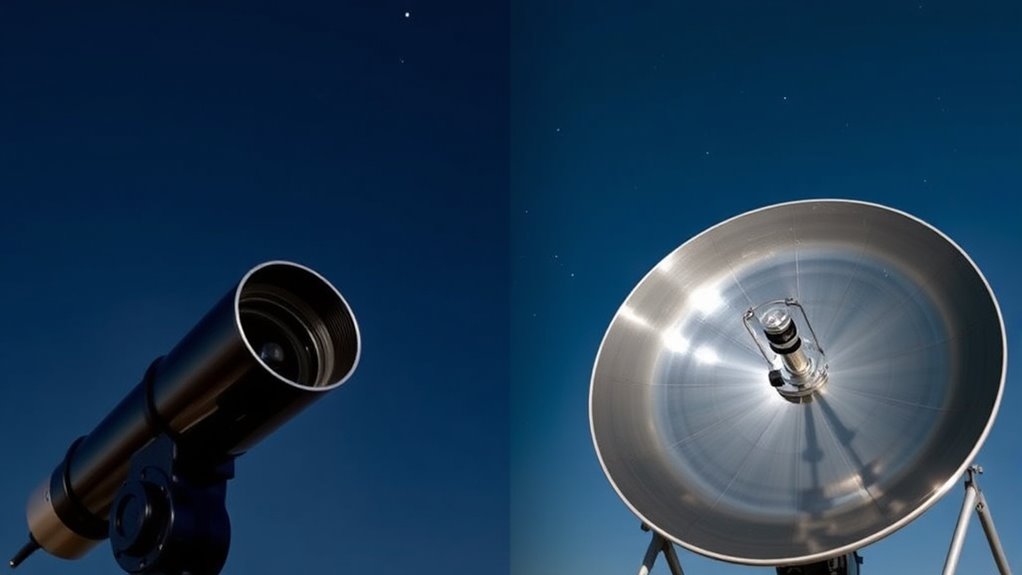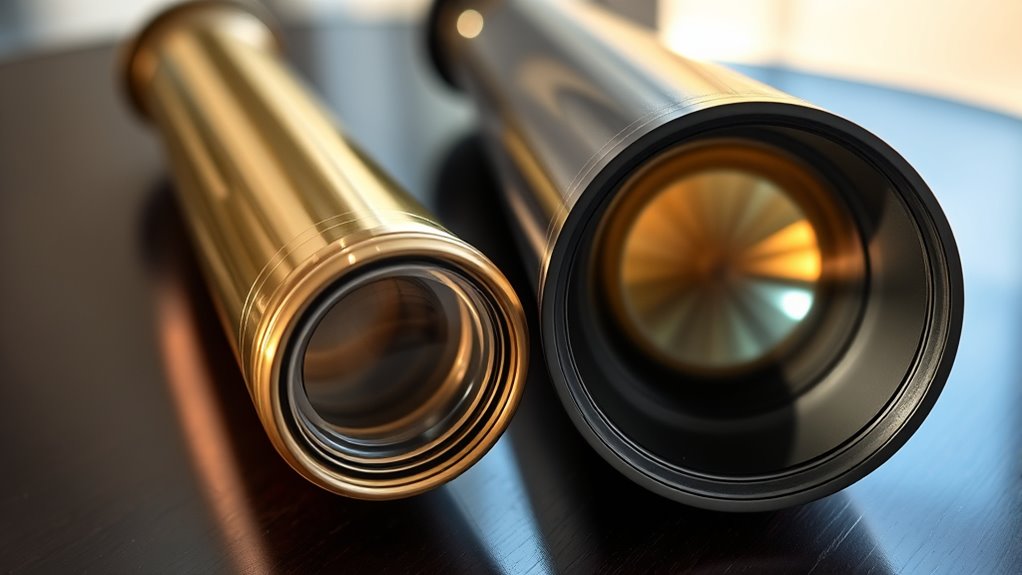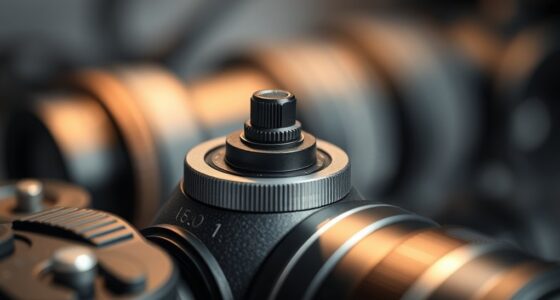When choosing between a refractor and a reflector, consider that refractors offer sharp, high-contrast images with minimal maintenance, making them great for planetary views. Reflectors tend to provide larger apertures at a lower cost, ideal for deep-sky observing but require regular mirror cleaning and collimation. If you want low fuss and durability, go for a refractor; if you prefer larger apertures and budget options, a reflector suits you. Exploring further will reveal which fits your sky-gazing style best.
Key Takeaways
- Do opt for refractors for sharp, high-contrast images with minimal maintenance, especially suitable for planetary observation.
- Do choose reflectors for larger apertures at a lower cost, ideal for deep-sky viewing.
- Don’t neglect regular cleaning and collimation of reflectors to prevent image distortion caused by dust and smudges.
- Do consider durability and portability; refractors are durable but sensitive to lens quality, while reflectors need mirror upkeep.
- Don’t ignore your budget and maintenance capacity; weigh the initial cost against ongoing upkeep when choosing your telescope.
Understanding the Core Differences Between Refractors and Reflectors

Refractors and reflectors are the two main types of telescopes, each with distinct optical designs that influence their performance. Refractors use lenses, so lens quality is vital for clear images, especially for detailed viewing. High-quality lenses reduce chromatic aberration and improve contrast. Reflectors, on the other hand, rely on mirrors, which require regular mirror maintenance to keep their surfaces clean and aligned. Dust or smudges can distort images, so proper care is essential. The main difference lies in how they gather light: refractors use a glass lens to focus light directly, while reflectors use a curved mirror to reflect and focus light. Understanding these core differences helps you decide which type suits your viewing needs and maintenance preferences. Additionally, the choice between the two can also impact the overall cost and durability of your telescope over time.
Key Do’s and Don’ts When Choosing Between Refractor and Reflector Telescopes

When choosing between a refractor and a reflector telescope, it’s important to take into account your specific viewing needs and maintenance preferences. For ideal optical clarity, refractors typically deliver sharp, high-contrast images with minimal adjustment, making them suitable for planetary observation. However, they often require more careful maintenance, such as lens cleaning and alignment. Reflectors, on the other hand, usually offer larger apertures at a lower cost, but their mirrors may need regular collimation and can be more sensitive to dust and misalignment. A key consideration is to assess how much time you’re willing to dedicate to maintenance. Don’t overlook your primary observing interests—if you prioritize low maintenance and portability, a refractor might be better. Conversely, if you want larger apertures for deep-sky viewing, a reflector could be the right choice. Incorporating vintage decor elements into your setup can also add an aesthetic touch that complements your observing space.
Frequently Asked Questions
Which Type Requires Less Maintenance Over Time?
You’ll find that refractors require less maintenance over time because they have sealed optical tubes, which protect against dust and moisture. Their durability factors mean fewer parts need cleaning or realignment, making them more reliable long-term. Reflectors, on the other hand, need regular mirror cleaning and collimation. So, if low maintenance is your priority, a refractor is the better choice, offering durability and minimal upkeep.
Are Refractors Better for Astrophotography Than Reflectors?
Absolutely, refractors are often better for astrophotography because they’re like steady ships sailing smoothly through the night sky. Their smaller aperture size and sealed tube make them less prone to misalignment, and their mounting stability ensures sharp images. Plus, they require less maintenance over time. While reflectors can be powerful, refractors offer a clearer, more consistent experience for capturing those stunning celestial details.
How Does Cost Impact Long-Term Telescope Ownership?
Cost considerably impacts your long-term telescope ownership, as budget considerations shape your initial purchase and ongoing expenses. Refractors often have higher upfront costs but tend to hold resale value better, making them a smarter investment over time. Reflectors are usually more affordable initially, but if you upgrade or replace parts, costs add up. Balancing your budget with potential resale value helps guarantee you choose a telescope that fits your long-term astronomy goals.
Which Telescope Type Is More Portable for Travel?
A journey of a thousand miles begins with a single step, so choose a telescope easy to carry. Refractors generally have a compact design and are lighter, making them more portable for travel. Reflectors tend to be bulkier and heavier, which can be cumbersome. For travel, you want a lightweight, compact telescope that fits easily into your bag, so a refractor is the better choice for portability and ease of transport.
Do Refractors or Reflectors Offer Better Image Clarity?
You’ll find refractors generally offer better image clarity because they have minimal lens distortion, giving you sharper, more contrasty views. Reflectors can sometimes suffer from issues like mirror alignment, which may introduce distortions or blurry images. Refractors are less affected by these problems, making them ideal if clarity is your priority. However, keep in mind that proper maintenance helps guarantee peak image quality for both types.
Conclusion
Choosing between a refractor and reflector telescope is about weighing clarity against size. While refractors offer crisp images and ease of use, reflectors provide larger apertures at a lower cost. It’s like picking between a sharp, focused lens and a broad, expansive mirror—each with its own strengths and quirks. Ultimately, your choice depends on what you value more: pristine visuals or the thrill of a bigger view. Either way, your stargazing journey awaits.








